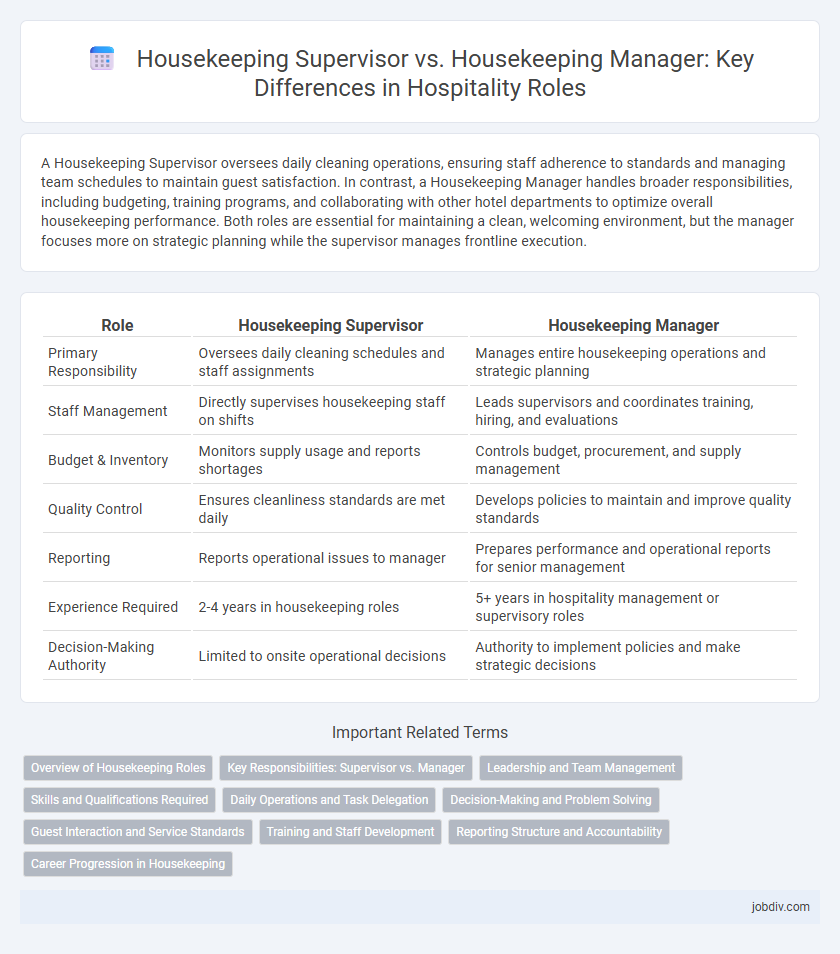A Housekeeping Supervisor oversees daily cleaning operations, ensuring staff adherence to standards and managing team schedules to maintain guest satisfaction. In contrast, a Housekeeping Manager handles broader responsibilities, including budgeting, training programs, and collaborating with other hotel departments to optimize overall housekeeping performance. Both roles are essential for maintaining a clean, welcoming environment, but the manager focuses more on strategic planning while the supervisor manages frontline execution.
Table of Comparison
| Role | Housekeeping Supervisor | Housekeeping Manager |
|---|---|---|
| Primary Responsibility | Oversees daily cleaning schedules and staff assignments | Manages entire housekeeping operations and strategic planning |
| Staff Management | Directly supervises housekeeping staff on shifts | Leads supervisors and coordinates training, hiring, and evaluations |
| Budget & Inventory | Monitors supply usage and reports shortages | Controls budget, procurement, and supply management |
| Quality Control | Ensures cleanliness standards are met daily | Develops policies to maintain and improve quality standards |
| Reporting | Reports operational issues to manager | Prepares performance and operational reports for senior management |
| Experience Required | 2-4 years in housekeeping roles | 5+ years in hospitality management or supervisory roles |
| Decision-Making Authority | Limited to onsite operational decisions | Authority to implement policies and make strategic decisions |
Overview of Housekeeping Roles
Housekeeping Supervisors oversee daily cleaning operations, ensuring staff adherence to hygiene standards and guest satisfaction, while Housekeeping Managers develop strategic plans to optimize workflow, manage budgets, and coordinate between departments. Supervisors act as frontline leaders, managing teams and handling immediate issues, whereas Managers focus on long-term resource allocation and policy implementation. Both roles are critical in maintaining high-quality cleanliness and operational efficiency within hospitality establishments.
Key Responsibilities: Supervisor vs. Manager
Housekeeping Supervisors oversee daily cleaning operations, coordinate staff schedules, and ensure adherence to hygiene standards on the floor. Housekeeping Managers develop cleaning policies, manage budgeting and inventory, and lead strategic planning for department efficiency and compliance. While supervisors handle team supervision and operational execution, managers focus on long-term management, staff training programs, and liaison with other hotel departments.
Leadership and Team Management
A Housekeeping Supervisor directly oversees daily cleaning operations, ensuring staff adherence to cleanliness standards while providing hands-on leadership and real-time feedback to team members. In contrast, a Housekeeping Manager focuses on strategic planning, resource allocation, and developing leadership skills within the team to enhance overall productivity and service quality. Both roles require strong leadership and team management abilities, but the Manager operates at a higher organizational level with broader responsibilities for performance optimization and staff development.
Skills and Qualifications Required
Housekeeping Supervisors must possess strong organizational skills, attention to detail, and the ability to lead and motivate cleaning staff while ensuring adherence to hygiene standards. Housekeeping Managers require advanced qualifications such as hospitality management certifications and proven experience in budget management, staff training, and strategic planning to oversee multiple teams and optimize operational efficiency. Both roles demand excellent communication skills, knowledge of cleaning protocols, and proficiency in inventory and quality control systems.
Daily Operations and Task Delegation
Housekeeping Supervisors coordinate daily cleaning schedules, inspect rooms for quality standards, and directly delegate tasks to housekeeping staff to ensure efficient operations. Housekeeping Managers oversee the broader operational workflow, develop cleaning protocols, and manage staffing levels, focusing on strategic task delegation and resource allocation across multiple teams. Both roles prioritize maintaining high cleanliness standards, but the supervisor handles front-line task management while the manager focuses on overall operational efficiency and staff performance.
Decision-Making and Problem Solving
Housekeeping Supervisors handle day-to-day operational decisions, ensuring staff adherence to cleaning standards and addressing immediate issues such as room readiness or supply shortages. Housekeeping Managers focus on strategic decision-making, including resource allocation, budget planning, and long-term process improvements to enhance efficiency and guest satisfaction. Problem-solving at the supervisory level involves direct resolution of staff and guest concerns, while managers analyze patterns and implement systemic changes to prevent recurring problems.
Guest Interaction and Service Standards
Housekeeping Supervisors directly oversee cleaning staff and ensure daily service standards are met through hands-on guest room inspections, maintaining guest satisfaction by promptly addressing complaints or requests. Housekeeping Managers develop and enforce overall cleaning protocols, staff training programs, and quality control measures to uphold brand standards and enhance guest experience across the entire property. Both roles emphasize guest interaction, but Supervisors focus on immediate service delivery while Managers concentrate on strategic oversight and long-term service excellence.
Training and Staff Development
Housekeeping Supervisors focus on hands-on training and daily staff guidance to ensure adherence to cleanliness standards and operational procedures. Housekeeping Managers develop comprehensive training programs and long-term staff development plans to enhance team skills and optimize workflow efficiency across multiple departments. Both roles prioritize continuous improvement, but managers emphasize strategic growth and performance management within the hospitality environment.
Reporting Structure and Accountability
The Housekeeping Supervisor reports directly to the Housekeeping Manager and oversees daily cleaning operations, ensuring staff adherence to standards. The Housekeeping Manager holds higher accountability for overall department performance, budgeting, and strategic planning, reporting to the General Manager or Director of Operations. Clear delineation of reporting structure improves operational efficiency and accountability within hospitality housekeeping departments.
Career Progression in Housekeeping
Housekeeping Supervisors typically oversee daily cleaning operations and staff coordination, serving as a critical stepping stone toward leadership roles. Progression to a Housekeeping Manager position involves expanded responsibilities such as strategic planning, budgeting, and quality control across multiple departments or properties. Career advancement in housekeeping emphasizes gaining managerial skills, operational expertise, and leadership experience to transition from supervisory roles to comprehensive management positions.
Housekeeping Supervisor vs Housekeeping Manager Infographic

 jobdiv.com
jobdiv.com